
#PoliceFreeCampus National Narrative Study
Are you a student or community member with an important story about being surveilled or interacting with campus police? Do you have a new, police-free vision for campus safety and security? Would you like to share it with our research team? The #PoliceFreeCampus National Narrative Study is an opportunity to contribute your experiences with campus law enforcement to our collective understanding of how police and policing
practices negatively affect campus climate and campus-community relations. Together with hundreds of others, your story will help create a compelling argument for colleges and universities to meaningfully divest from the institution of policing and invest in humanizing resources and supports to public safety and security, on-campus and beyond. Using 1-hour virtual interviews, you will meet with a member of our research team to discuss
your experiences, perspectives, and visions for a police-free future. All participation is voluntary and contributors to the study are able to withdrawal at any time. Simply review the study consent form, complete the interest form, and setup an interview time with our team at your convenience.
This study is supported by funding from the National Center for Institutional Diversity at the University of Michigan.
#PoliceFreeCampus Digital Ethnography and Instrumental Case Study
A Digital Ethnography of Black Campus-Community Resistance, New Media Organizing, and Abolitionist Praxis for a Police-free Future
The killing of Black people and the occupation of Black neighborhoods by police in the United States is not a phenomenon unique to municipal police departments. In fact, 771 colleges and universities spend an average of $2.7 million annually to employ and arm sworn officers in campus police departments, at least two of which have been responsible for the killing of unarmed Black people during off-campus patrols in recent years. More routinely, however, campus policing employs mechanisms of surveillance, criminalization, and carceral punishment to enforce various social, symbolic, and spatial boundaries between White-serving postsecondary institutions and the Black communities within which they are located.
Within the framing context of the #BlackLivesMatter movement, our digital ethnography broadly explores the ways such postsecondary boundary enforcement renders Black people, on-campus and beyond, vulnerable to police brutality and state-sanctioned violence. More specifically, our study seeks to understand and document the digitally-mediated processes by which Black campus actors and community stakeholders are collectively resisting the racial project of policing and challenging postsecondary institutions to adopt abolitionist visions of public safety and community care. Altogether our study will offer new insights regarding the contemporary relationship between campus and community-based movement work as well as the tactical repertoires employed to effectively organize across policing boundaries. Furthermore, our study will provide a compelling case for effectively reimagining possibilities for institutional and community safety devoid of police.
This study is supported by the from the National Academy of Education/Spencer Foundation Postdoctoral Fellowship and funding from the National Center of Institutional Diversity at the University of Michigan.
#PoliceFreeCampus Crime and Campus Safety Study
Using data from the Survey of Campus Law Enforcement Agencies and Campus Safety Survey, as well as other sources, the #PoliceFreeCampus Crime and Safety Study is performing a series of analyses to identify patterns and relationships between college and university spending on campus police, campus safety incident reports, and police interactions with campus and community stakeholders. Findings from these analyses will be published in a first-ever nationally comprehensive report in Fall 2022.
